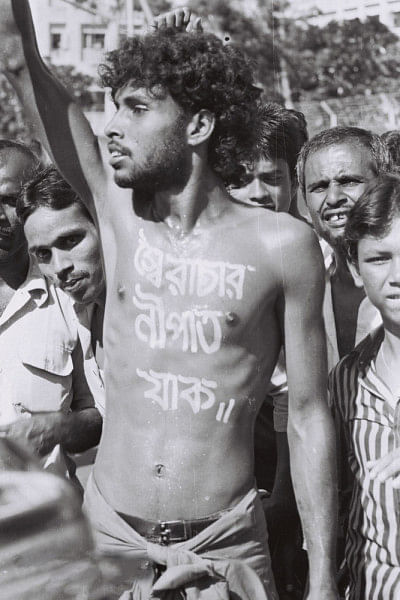Why I am not celebrating

In a recent commentary piece, Mr. Mahfuz Anam shed light on the Democracy Restoration Day and outlined the demands that the then tripartite alliance between the Awami League-led 15-party coalition, the BNP-led 7-party coalition and a group of left-leaning parties, made to the nation. In summary, December 6, 1990, represents the fall of the military-autocrat General HM Ershad from presidency, a victory for democratic principles and the fulfilment of the prerequisite for our two leaders to lead the nation. Yet sadly, Mr. Anam's commentary and other media reports are the sole mainstream sources of material pertaining to this significant event. And for someone who was not even born during the anti-Ershad struggle, such is all the information we get and have. That, my countrymen, is a massive insult to all those who had fought on the streets to restore multi-party democracy in Bangladesh. It is an insult to the Noor Hossains and the Dr. Milons, and to an extent, to the freedom fighters who had so ardently fought to establish people's rule in Bangladesh. We cannot let our country fall to such a pit.
I cannot, nor should I, speak for a different generational era, when it comes to politics. I am sure for Mr. Anam and his colleagues, the Ershad-era of the 80s and the subsequent election of Khaleda Zia in 1991 to the Prime Minister's office, must have been a riveting period of journalistic excitement. Nevertheless, for those born after 1990, Democracy Restoration Day is sadly not a regular instalment in the annual celebratory calendar. Why? Well, partly because my generation, and especially those in the middle-class or above, have disenfranchised themselves from politics. Parents do not want their children to aspire to be a politician, neither do most teenagers feel it necessary to pursue an academic career which may allow for a route to politics. This is not to say we have no interest in government or governance. We surely do. But that remains in the vicinity of conversations at the dinner table and social media arguments. We are surely at fault for being ignorant and unenthusiastic in some cases. However, there remains another strong reason, and that very reason is why I am writing this op-ed.
Whereas December 6 should be the day when the people of Bangladesh come out in the streets and celebrate the culmination of a game changing united movement to oust a dictator, whilst wholeheartedly observing the instillation of parliamentary democracy, it is a day where we contemplate the future of this country's politics. For the youth of the country, politics is all about Sheikh Hasina and Khaleda Zia. We observe them, we criticise them, we compliment them. We have not seen Bangabandhu or Ziaur Rahman, neither have we been part of the Ershad era. But neither of our two leaders, publicly or tangibly, showcase their reverence for democratic values to the extent where people deem it suitable and sufficient. Yet, without their combined democratic efforts to oust Ershad, neither our current Prime Minister nor Khaleda Zia would have reached the position and reputation they have today. December 6 should have been a celebration of two strong women, differed by political ideologies but united by a desire to build democracy. Yet, we see quite the opposite. I do not see the Awami League celebrating this day wholeheartedly as they do when the Prime Minister returns from a successful foreign trip. I do not see BNP workers lining the streets passionately as they do when Khaleda Zia visits her husband's grave on the foundation anniversary of the party. Without December 6, 1990, Bangladesh would never be able to proudly boast its unique female leadership at the top of the political establishment. Yes, we read a statement here and there, and yes, we observe a few rallies, yet Democracy Restoration Day and the values which it represents, surely do not get an ounce of attention that they deserve from our political parties.
Ershad's rehabilitation into the political scene and his subsequent association with both the AL and BNP might explain why we do not make a fuss about the restoration of democracy. To his credit, the General has survived valiantly. And to the credit of both leading parties, they have utilised him well. It is basic politics. The politics of survival. But at the same time, it is ugly politics. It is the brand of politics which deters the youth from showing interest. It is that ugliness which prevents parents from thinking about motivating their children to be the next Maulana Bhashani or AK Fazlul Haq. One questions why we fought so ardently to restore democracy, only to be back to a system where the opposition is treated as merely a fringe actor in the political process.
Nevertheless, as Bangladeshis, it is in our genes to remain hopeful. We demand that the principles based upon which Ershad was brought down and the unity shown by Sheikh Hasina and Khaleda Zia during that period, reverberate onto our current day actions and are practiced across the political aisle. The leadership is still the same, yet egotism and personal issues seem to have gotten in the way of practicing cooperative democracy. We can build the democracy that we foresaw in 1990. We can celebrate our system proudly one day. We can ensure increased youth participation. All we need is for our political leadership to respond to the wills and wishes of our people. The youth and the whole of Bangladesh so desperately want a positive sign from its politicians. They want to see participatory democracy. They yearn to be motivated into tangibly and philosophically participating in our political story.
We want to rejoice Bangladesh's democracy. We want to make politics a supporting hand to our extensive development, and not an unstable deterrence. If we do not do that, then as Mr. Anam rightly points out, democracy will continue to be for the winners only and we will continue seeing the educated youth distance themselves.
The writer is a third year undergraduate student of Economics and International Relations at the University of Toronto. Email: [email protected]
Photo: Dinu Alam on Facebook/Dinu Alam on English Wikipedia (https://commons.wikimedia.org/wiki/File:Rally_of_Nov_10,_1987_-_1.jpg), "Rally of Nov 10, 1987 - 1", https://creativecommons.org/licenses/by-sa/3.0/legalcode

 For all latest news, follow The Daily Star's Google News channel.
For all latest news, follow The Daily Star's Google News channel. 



Comments